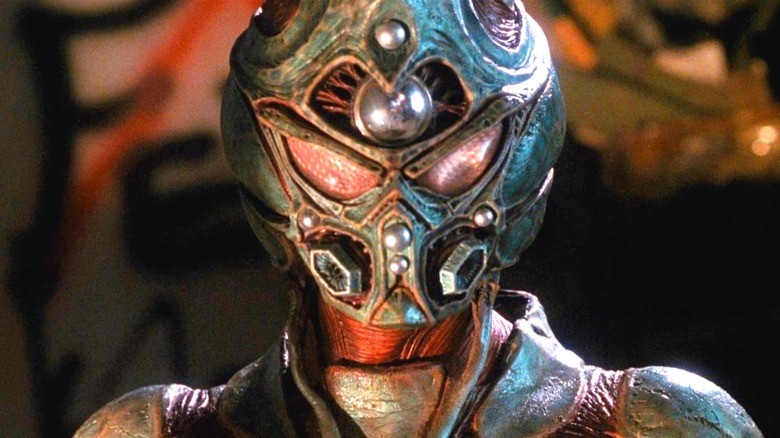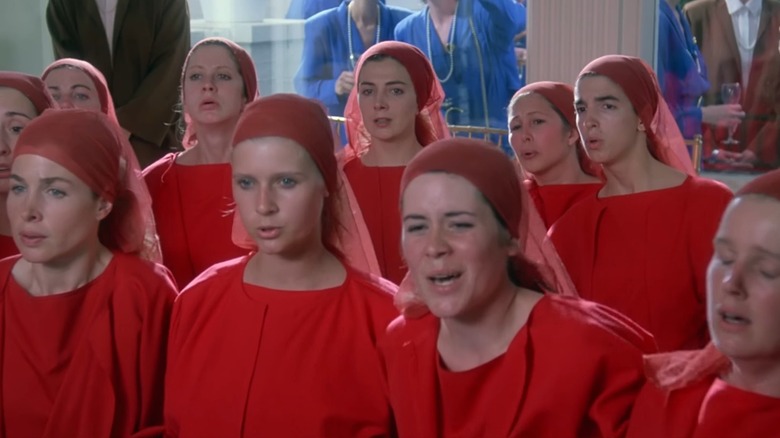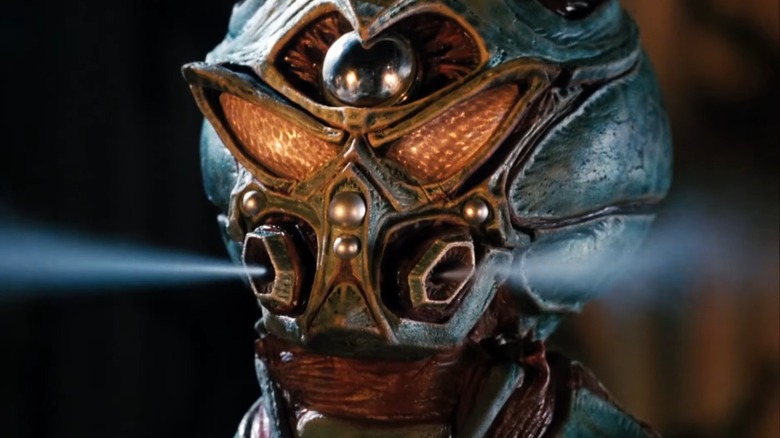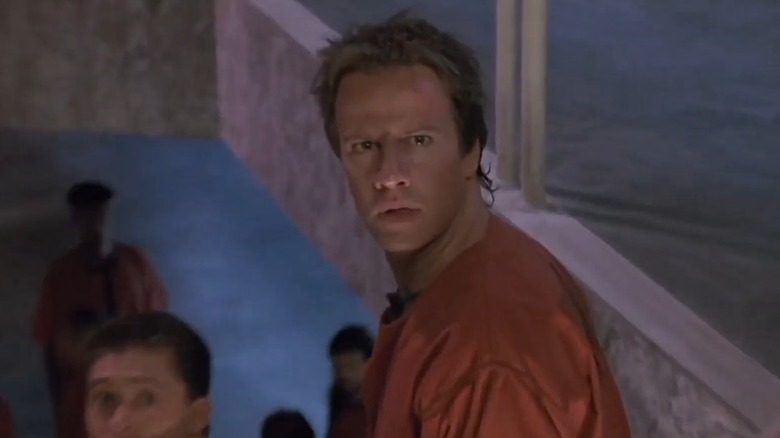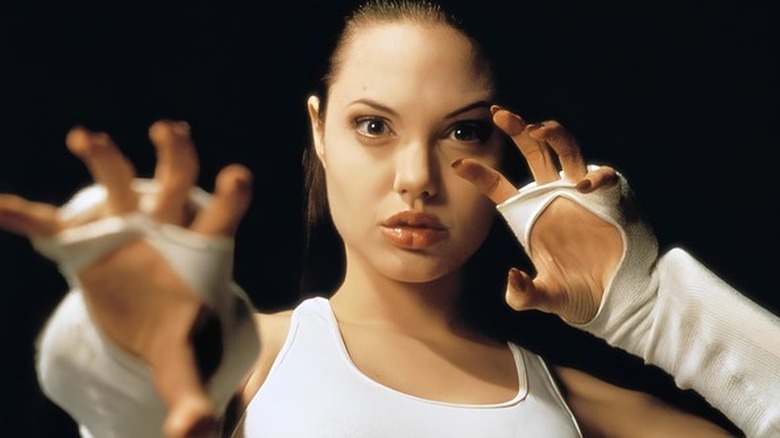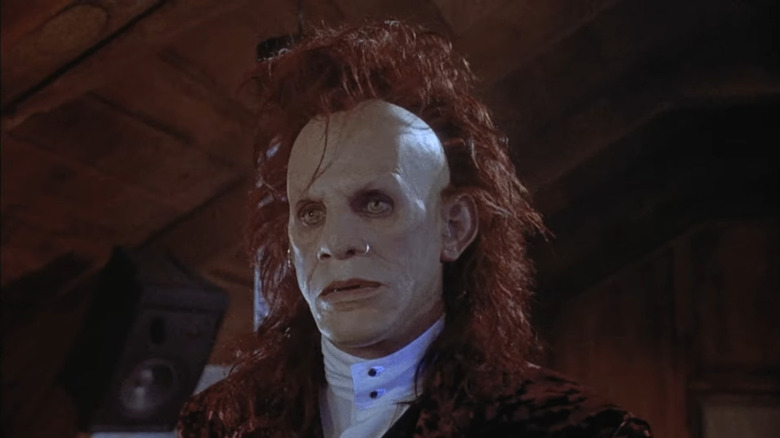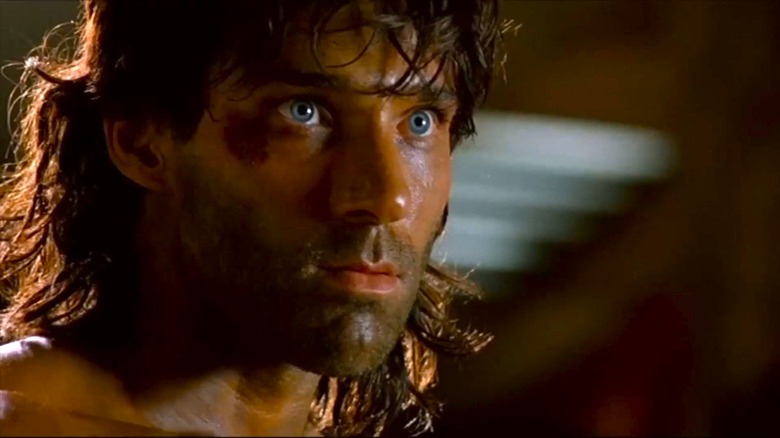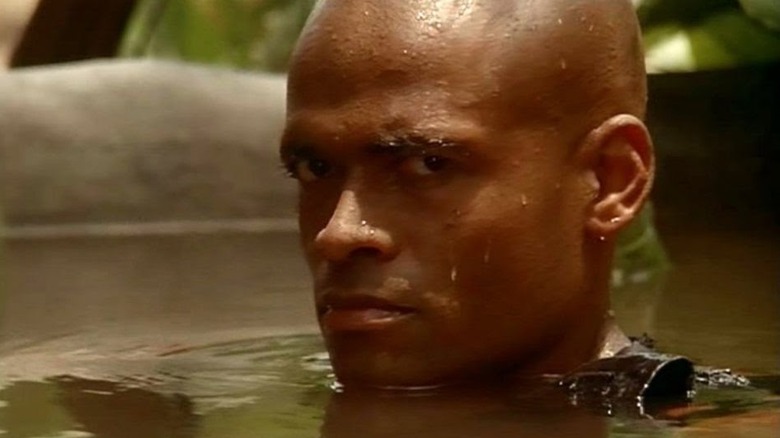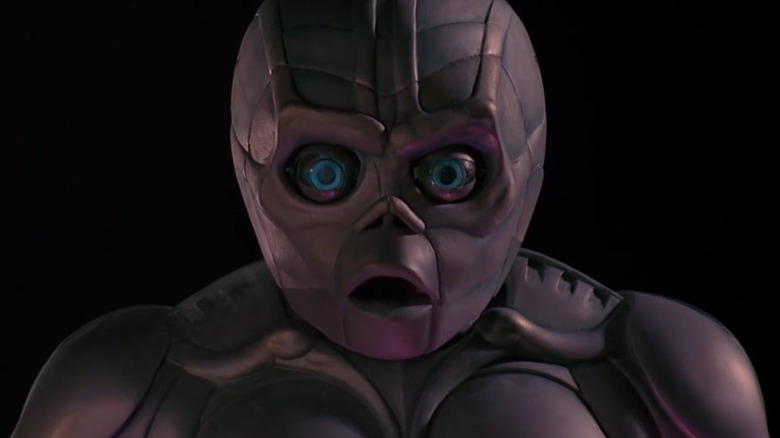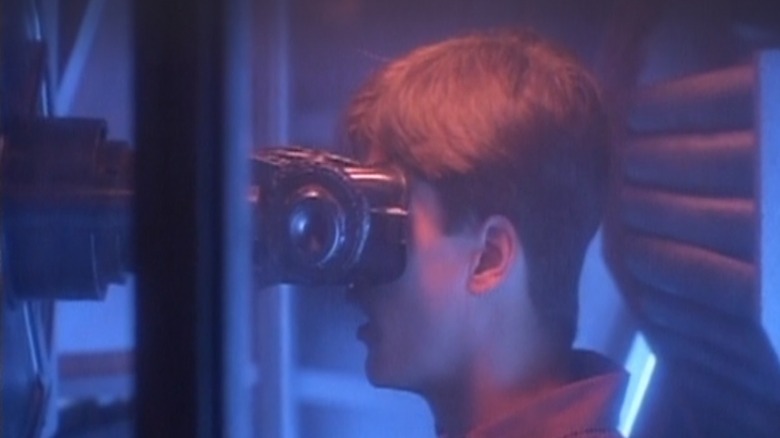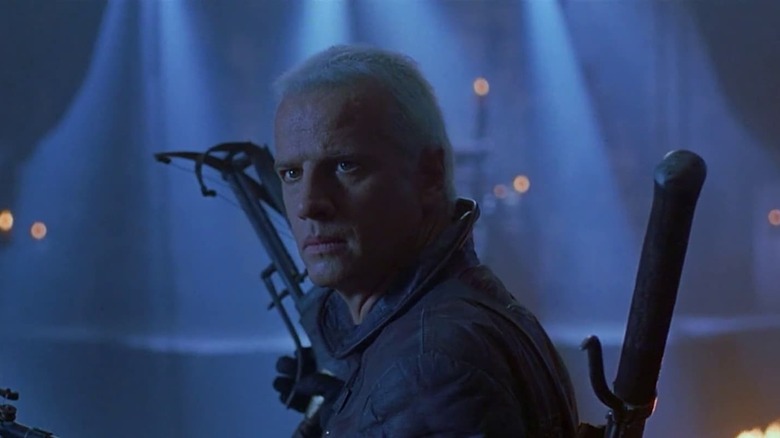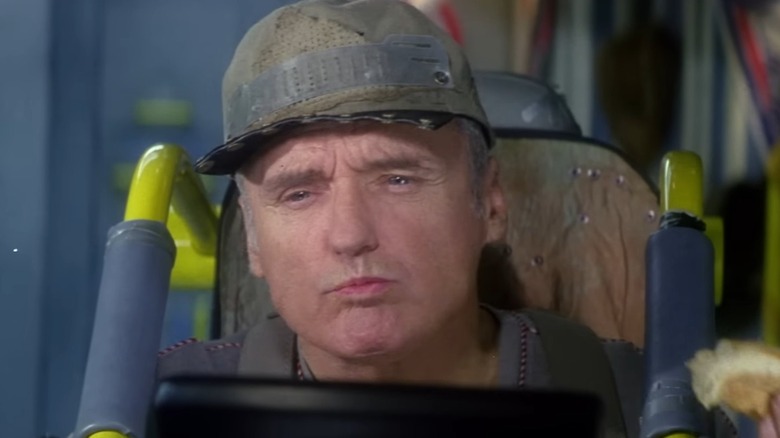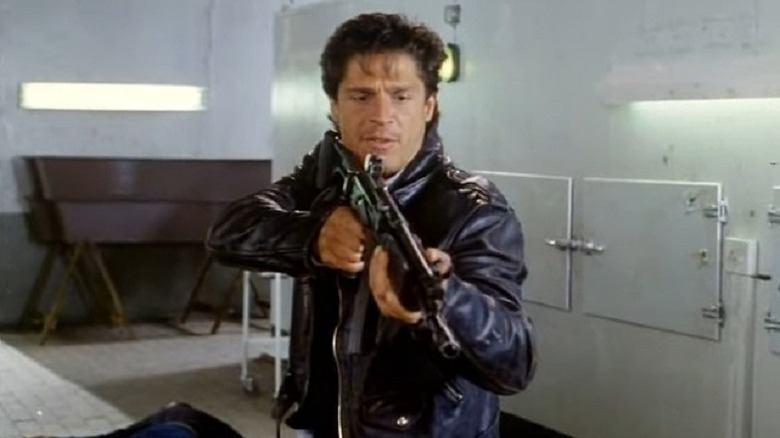Obscure '90s Sci-Fi Gems You Need To Watch
The 1990s weren't only a time for the Tamagotchi and troll dolls — the decade also signified a hot streak for sci-fi cinema. From "The Matrix" to "Total Recall," the genre showed up for the blockbuster season and served a number of instant classics throughout the decade. In fact, even the less-celebrated releases back then, such as "Dark City" and "The Thirteenth Floor," are receiving praise today. But another layer of sci-fi gems exists under these releases, which falls right into the category of "Oh, I didn't even know that this film existed."
Some of these may be recognized by diehard fans and genre connoisseurs, but the general public largely ignored these releases, leaving them as relics of the past buried deep in the recesses of a few minds. This doesn't take anything away from their quality or enjoyability factor, though, since success in the entertainment industry is ineffable. Although they may not be famous, they're still worthwhile in their own right.
With that said, sit back and prepare to make that watchlist a little longer by discovering a host of obscure '90s sci-fi movies that need to be experienced. After all, it's never a bad time to revisit the past and uncover the treasures of the 1990s.
The Handmaid's Tale (1990)
Every season of Hulu's "The Handmaid's Tale" dominates the award ceremonies and receives plaudits from fans and critics. The show also solidified Elisabeth Moss as bona fide TV royalty, while also doing more than enough justice to the source material, the 1985 dystopian novel written by Margaret Atwood. However, before the show, "The Handmaid's Tale" had another adaptation in the form of a 1990 movie.
Directed by Volker Schlöndorff, the film takes place in the distant future where Kate (Natasha Richardson) tries to escape the Republic of Gilead, but she is captured and forced to be the Commander's (Robert Duvall) slave. Ultimately, Kate — now named Offred — tries to fight off the brainwashing of the Handmaids' cult, dreaming of her previous life and longing for freedom.
While "The Handmaid's Tale" struggles to find a definitive voice and doesn't quite live up to the superior TV show, this film crawled so that the show could walk. It was never going to be easy to adapt Atwood's novel with all its subtexts, but Schlöndorff's feature tries to make sense of it all at a time when the majority of the audience wasn't prepared for such a hard-hitting message. Also, it probably didn't help the film's poster made it look like a B-grade erotic thriller.
The Guyver (1991)
Until his performance as the Joker in "Batman: The Animated Series," Mark Hamill struggled to shake off being seen only as Luke Skywalker from "Star Wars." In 1991, Hamill took a shot at the live-action adaptation of Yoshiki Takaya's manga series "The Guyver." Directed by Screaming Mad George and Steve Wang, the sci-fi superhero flick tells the story of Sean Barker (Jack Armstrong) who discovers an alien armor that bonds with him and turns him into the super-powered cyborg known as Guyver. Hamill appears in the film as the supporting character CIA Agent Max Reed, even though he receives top billing and the film poster leads the general public to believe he is the Guyver, not Armstrong.
Despite "The Guyver" not receiving the fanfare of its fellow cyborg hero of the time, RoboCop, the movie earned love from the manga community and reviewers who appreciated what it achieved with a tiny budget of $3 million. Cinapse's Ed Travis wrote: "One part 'Power Rangers,' all parts awesome, 'The Guyver' is weird, wild, and wonderful, featuring incredible creature designs and make up effects, fantastic martial arts action, and an impossibly weird and indelible world all on what must have been a shoestring budget."
The film received a 1994 sequel titled "Guyver: Dark Hero", although neither Hamill nor Armstrong returned for the movie.
Fortress (1992)
How can a film that made over $45 million worldwide off a $12 million budget be considered obscure? That's a good question. But mention 1992's "Fortress" to anyone nowadays, and most people won't have a clue what you're talking about.
Directed by Stuart Gordon and starring Christopher Lambert and Kurtwood Smith, "Fortress" takes place in the future where families are only allowed one child per household. When John Henry Brennick (Lambert) and his wife, Karen (Loryn Locklin), attempt to have a second child in secret, they are caught and chucked into a maximum security prison where cruelty is the order of the day. Naturally, the only option is for them to escape from the — ahem — fortress.
The New York Times' Stephen Holden summed up the film perfectly, describing how "it blends 'RoboCop,' 'The Handmaid's Tale' and 'Brave New World' into something scary, original and grimly amusing." While the actual prison escape plot is something found in a multitude of films, "Fortress" keeps the action and excitement moving at a breakneck speed, with leading man Lambert fantastic as always. The film received a sequel in 2000 titled "Fortress 2: Re-Entry," which saw Lambert reprise his role as Brennick.
Cyborg 2 (1993)
Jean-Claude Van Damme fans know all about 1989's "Cyborg," which basically exists because The Cannon Group couldn't make "Masters of the Universe 2" and "Spider-Man" so director Albert Pyun cobbled together a new plan with all the props and sets. Yet this sci-fi action story received a sequel in 1993 titled "Cyborg 2: Glass Shadow" — sans JCVD.
Despite not having the Muscles from Brussels flexing and doing the splits, the film still possessed star power in the form of Angelina Jolie, Elias Koteas, Billy Drago, and Jack Palance. Directed by Michael Schroeder, "Cyborg 2" tells the story of cyborg assassin Cash Reese (Jolie). When it comes time for her to be taken out of commission, she rebels against the baddies and receives assistance from Colt Ricks (Koteas) and another cyborg named Mercy (Palance).
While "Cyborg 2" isn't about to win any awards or retrospective pieces about why it's the greatest sci-fi film of the 1990s, it's silly, turn-off-the-brain fun — much like the original movie, really. Jolie might not be the biggest fan of her debut as a leading actor, but it does show hints of why she would become one of the brightest stars in Hollywood. The franchise didn't end here either, as "Cyborg 3: The Creation" arrived a few years later.
Brainscan (1994)
Before "Gamer" and "Choose or Die," "Brainscan" paved the way for video game-themed sci-fi horror movies in 1994. Directed by John Flynn from a script written by Andrew Kevin Walker of "Seven" fame, the film centers on teenager Michael (Edward Furlong) who becomes obsessed with a realistic video game called "Brainscan," which lets a player take on the role of a murderer. Things go awry when Michael realizes his crimes in the game are happening in the real world as well. It gets worse when an evil entity from the game known as Trickster (T. Ryder Smith) appears and won't allow Michael to stop playing this devilish game.
"Brainscan" wasn't exactly warmly received upon arrival, sitting on a 13% critical approval rating on Rotten Tomatoes. However, the audience score paints a different picture, shining bright with 60%, reminding us it is the kind of film that endears itself after multiple rewatches.
In a later interview with Foco, Flynn revealed how the role of the Trickster was what appealed to him the most about the film, while saying he didn't have a great experience working with Furlong. "The Trickster was the core of the movie and what attracted me to the script," Flynn said. "We found this stage actor to play the Trickster and he was extraordinary. Eddie Furlong was a 15-year-old kid who couldn't act. You had to 'slap him awake' every morning. I don't want to get into knocking people, but I was not a big Eddie Furlong fan."
Fist of the North Star (1995)
In manga, Buronson and Tetsuo Hara's "Fist of the North Star" is widely regarded as one of the most important series of all time. It has been many fans' entry point into the medium, and still stands supreme to this day. Expectedly, there have been several adaptations of the story, including a 1995 live-action film starring Gary Daniels, Chris Penn, Costas Mandylor, and Malcolm McDowell.
Directed by Tony Randel, this movie takes the story back to the beginning where the martial arts warrior Kenshiro (Daniels) seeks revenge against his arch-rival Lord Shin (Mandylor) in the barren wasteland of a post-World War III Earth. While this adaptation doesn't hold a candle to the 1986 animated film, it has its own unique charm in the same way that 1994's "Street Fighter" makes for an entertaining watch. Sure, it's cheesier than a block of mozzarella and the effects are laughably bad in the modern day, but the fight scenes make it worthwhile for a Friday night viewing.
The Action Elite agreed, writing, "This is quite a surreal film but also one of Daniels' more ambitious; you can tell it had a limited budget but the fight scenes alone make this worth watching with Daniels doing what he does best."
Solo (1996)
Taking one look at the trailer for 1996's "Solo," the average person would think it's a spiritual sequel to "Universal Soldier" or a "RoboCop" rip-off. After all, this is the story of an android soldier named Solo (Mario Van Peebles) who develops a conscience and turns on his creators. Instead of wasting people for the fun of it, he decides to help a village and its people, as he protects them from enemy attacks and becomes a one-man army. The movie, though, is actually based on the Robert Mason novel titled "Weapon."
Described as a techno-thriller, "Solo" doesn't overcomplicate its plot or try to be something more than what it is. Yes, it's big dumb fun as Van Peebles' character blows things up and creates carnage wherever he goes, but no one ever positioned this as having the emotional nuance of "Saving Private Ryan" in the first place. Doug Thomas of The Seattle Times thought of the film as an unexpected treat, stating, "'Solo' has the right amount of rugged scenery and Indian lore, a hip score (by Christopher Franke) and clever sequences to make its 93 minutes whiz by."
Star Kid (1998)
Much like the meme, when someone's mother says, "We have 'Blue Beetle' at home," they are likely referring to 1998's "Star Kid." Written and directed by Manny Coto, this superhero flick follows schoolkid Spencer Griffith (Joseph Mazzello) who receives an extraterrestrial AI cyber-suit named Cy that gives him powers after a meteorite crashes on Earth. Since this is a movie largely aimed at children, Spencer gets into all sorts of mishaps with his new powers. However, in the end (and quite predictably so), he learns how he doesn't need the suit to be a hero, since the real power lies within and everyone says, "Aw." (Uncle Ben would be proud of him.)
Renowned and celebrated critic Roger Ebert gave it a glowing review, writing how it "has a sweet heart and a lot of sly wit, and the symbiosis between boy and cyborg is handled cleverly. For kids of a certain age, it pushes the right buttons."
Arcade (1993)
Unquestionably, Albert Pyun's "Arcade" owes a lot to "Tron." In this film, Alex Manning (Megan Ward) and her friends receive a new virtual reality game called "Arcade" to test out and play. While that might sound like a sweet deal and a fun way to get a free game, it isn't, since this sinister game entraps its players in this world created by the nefarious bad guy known as Arcade. Escaping this never-ending death trap proves to be about as difficult as the "Dark Souls" video game series.
Sure, "Arcade" comes across as something of a "Tron" rip-off — and there was actually a legal situation because of the CGI similarities — but it also manages to capture the culture of the era in both its look and feel. Written by David S. Goyer, who went on to pen blockbuster films like "The Dark Knight" and "Blade," Pyun juggles the balance between the sci-fi and horror elements of "Arcade," as even the main antagonist comes across like a slasher villain.
If the audience is in the mood for pure B-movie vibes and a reminder of '90s fashion, they can't go wrong with "Arcade."
Beowulf (1999)
Most audiences are familiar with the 2007 CGI "Beowulf" film, which was directed by Robert Zemeckis from a screenplay written by Neil Gaiman and Roger Avary. However, eight years earlier, there was another adaptation of the epic poem released.
Directed by Graham Baker, "Beowulf" embraces both sci-fi and fantasy elements as it takes the story into a post-apocalyptic world. In this version, Christopher Lambert plays Beowulf as he fights the beast known as the Grendel, while also harboring his own secrets. Lambert is joined by the likes of Rhona Mitra and Oliver Cotton in the film.
This 1999 adaptation might not have the pomp and circumstance of the 2007 retelling, nor does it bother with the intricacies of the classic story, but it works well as a sci-fi/fantasy movie. The set design catches the eye, while the action never falters and Lambert provides a committed performance of the character. Also, how can anyone hate a soundtrack that features Fear Factory and KMFDM?
Space Truckers (1996)
Despite the serious nature of the sci-fi genre and its harrowing reminders to humanity that we are all doomed, not every movie tries to be glum or riddled with too many philosophical messages. Take Stuart Gordon's 1996 feature "Space Truckers," for example. This lighthearted space opera romp delivers chuckles through a ridiculous and outrageous plot that sees space trucker John Canyon (Dennis Hopper) take a job to transport cargo to Earth. Unknown to John, his delivery contains a bunch of killer robots, and events are about to go south very quickly when he encounters space pirates. Starring alongside Hopper are Stephen Dorff, Debi Mazar, Charles Dance, and Barbara Crampton.
"Space Truckers" never falls into a complete parody of the genre like "Spaceballs," but it doesn't take itself too seriously either. Gone with the Twins' Mike Massie gave the film a positive rating, writing, "'Space Truckers' adopts a fun and action-packed yet oddly violent and bizarre tone, mixing light grotesqueries with plenty of 'Star Wars' derivations."
Cyborg Cop (1993)
David Bradley remains an unheralded hero of early '90s action cinema. While the typical B-grade Cannon film fare had slowly started to evaporate into the ether, Bradley kept the shlocky genre alive through films that had the budget of a cheese and tomato baguette. He might be better known for turning up in the later "American Ninja" sequels, but Bradley kickstarted another franchise in 1993: "Cyborg Cop."
Helmed by "American Ninja" director Sam Firstenberg, "Cyborg Cop" sees DEA Agent Jack Ryan (not that Jack Ryan) receive a distress call from his brother, Phillip (Todd Jensen), who finds himself under threat on a Caribbean island. Jack heads off to find his brother, but when he arrives, he discovers Phillip is now a dangerous cyborg, and he needs to stop him. The film also stars John Rhys-Davies who looks like he is having a ball as he hams it up as Professor Joachim Kessel.
"Cyborg Cop" is about as subtle as a sledgehammer to the head, but it deserves a special place next to other sci-fi action films of the era. Forget about the plot – who doesn't want to see a martial artist fighting a cyborg all day long? For those interested, two further sequels were released in 1994 and 1995, respectively.
